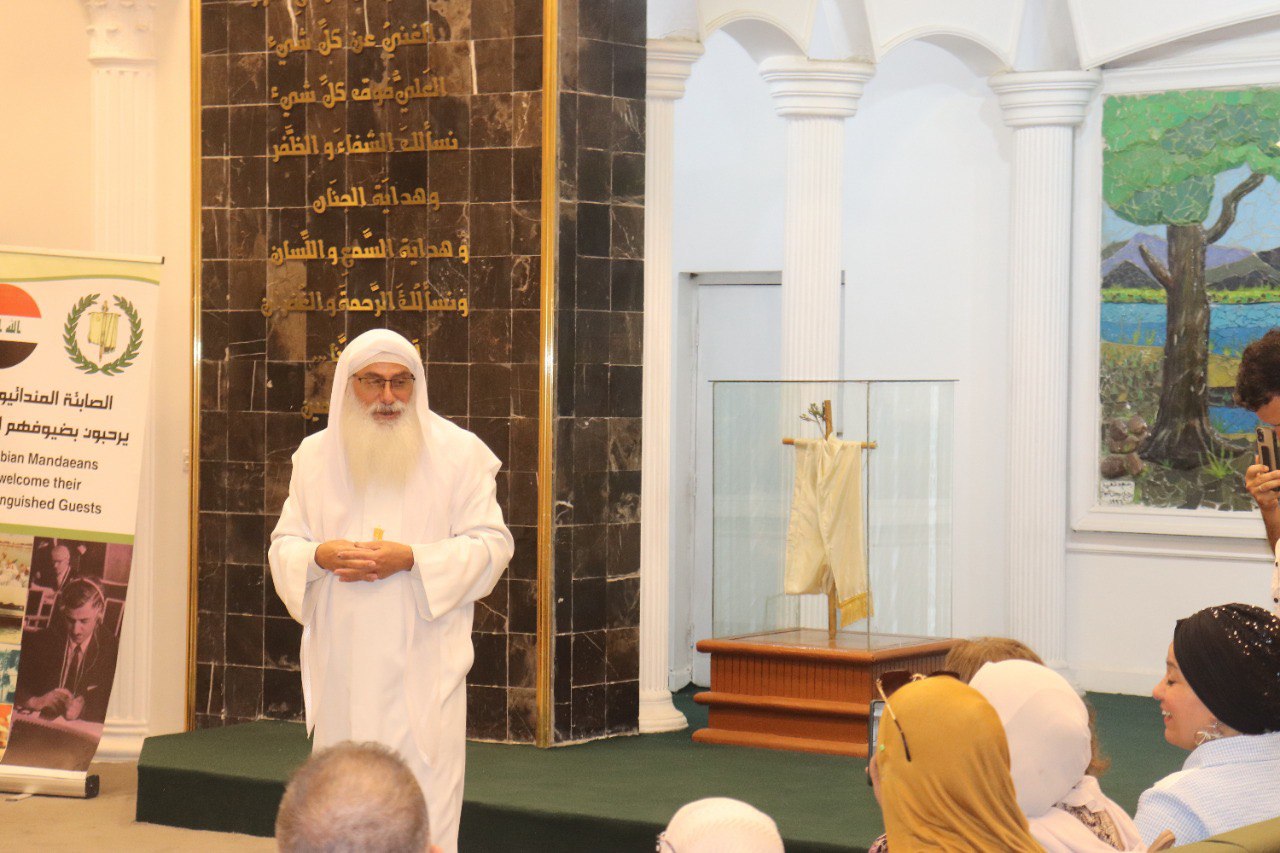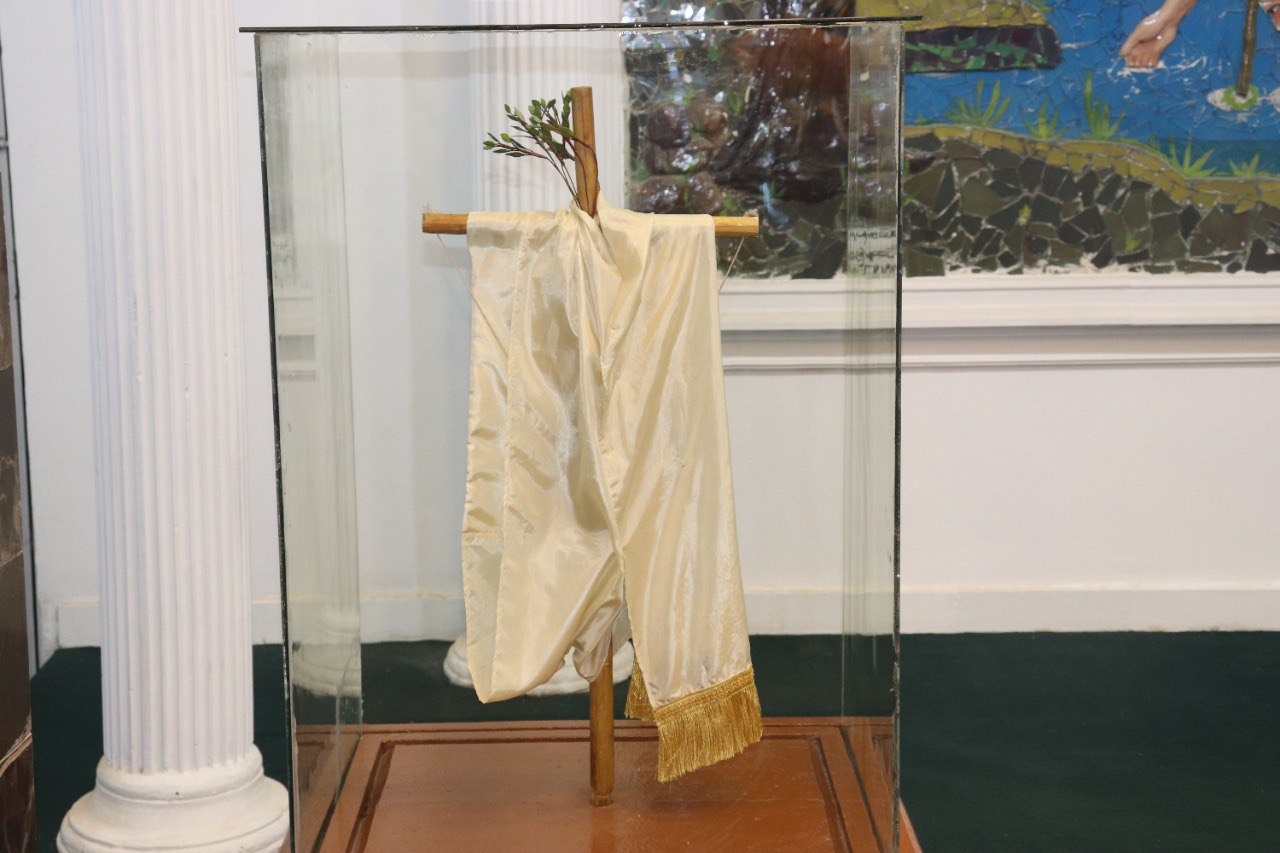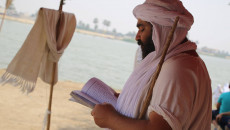Samar Nabil did not expect her closest friend to leave her one day and leave behind all their memories just because she knew that Nabil was a follower of the Sabean Mandeans religion.
She never expected a similar attitude from her fellow students, who would make unsubstantiated claims, while they are postgraduates and well-educated and should know who the Sabean Mandeans (Sobbi in Iraqi dialect) are.
A few weeks later, she faced another shocking slam when a university classmate asked her for the address of a "witch” to help her get married. When Nabil exclaimed why she chosen her, she simply replied that Sabean Mandeans are talented in witchcraft.
The Sabean Mandeans suffer from discrimination due to misinformation about their religion by some sections of Iraqi society, which they believe is partly due to lack of accurate information and sometimes deliberately created for different purposes.
"There are many misconceptions about the Mandaesm in Iraqi society, including misinformation that leads to misjudgments cause great suffering for the followers of the religion," Faiza Dhiab, Sabean activist, told KirkukNow.
Misconceptions also exist among other Iraqi communities with whom Sabean Mandeans followers live together in central and southern Iraq. The case is true for other ethno-religious minorities such as the Ezidis (Yazidis).
The mistakenly common view leaves a negative impact on the minds of Sabean followers, especially children and youth
“This mistakenly common view has had a negative impact on the minds of Sabean followers, especially children and youth, creating the belief among most of us that society does not accept us because of our religious affiliation,” Dhiab added.
She said some of the charges they face are that they practice "magic", worship "planets and stars" and are "dirty" people, which makes them unfit for society and forced them to migrate.
Sabean Mandeans, considered the oldest unified religion of mankind, originated in the Rafidain Valley, specifically in southern Iraq, in the province of Maysan and the plains near the springs and rivers that became part of the religion's rituals and traditions.
Mandaeans were probably the first to practice baptism. They are a closed ethno-religious community, practicing Mandaeism, which is a monotheistic religion. The Mandaeans classify existence into two main categories: light and dark. They have a dualistic view of life, that encompasses both good and evil; all good is thought to have come from the World of Light and all evil from the World of Darkness.

Ibtihal Naji, an Iraqi Muslim woman, said there is a common misconception among the society about Sabean Mandeans “because of ignorance and exchange of wrong information among the people.”
"Kanza Raba" prohibits witchcraft
Misinformation and distortion, such as linking Sabean-Mandean traditions and rituals to witchcraft, is one of the prevailing views in the community, while practitioners of the religion reject it and describe it as targeted propaganda.
"The Sabean religion forbids witchcraft," said Sheikh Star Jabbar Al-Hilu, head of the Sabean Mandeans community in Iraq. He affirms it is considered a grand taboo.
“Any one practices it, won’t see light of God almighty and the proof is the verses in Kanza Raba,” he added.
The holly book of the Mandaeans is called "Kanza Raba", which means Sacred Treasure, which is written in Aramaic, considered to be the Sabean language, and consists of two parts: the first part deals with the world in its commandments, rules and concepts, and the second part deals with the soul after death and its departure from the body.
The propaganda of witchcraft is carried out on by some people on social media platforms, whom use photos of Sabean clerics or community.
Such propaganda has nothing to do with the Sabean Mandeans religion
The leader of the Sabean Mandeans community in Iraq and around the world says such propaganda has nothing to do with their religion. Some have been arrested by community police and found out they were followers of other religions.
The Senior Mandean clergy called for the support and coordination of the security forces, the government and the people to stop anyone who uses their names for witchcraft, withdrawing money and deceiving people.
Samar Nabil, who contacted one of the people who claimed to be a Sabean religious man, spoke to him in ancient Aramaic and found that he understood nothing of the language because he was not Mandean.
The oldest monotheistic religion
Followers of Mandaesm believe in the "One God, the Creator", since it is a monotheistic religion and are against propaganda that tries to portray them as unbelievers (infidels).
The Sabean Mandaesm is the oldest monotheistic religion that believes in one God as the verses of Kanza Raba attributes the features of Grand Creator God exposed to the prophets Adam, Seth, Idris, Noah, Sami son of Noah and John son of Zechariah, the clergy elaborates, all prophets mentioned in the Abrahamic religions: Judaism, Christianity and Islam.
Video: Information on the Sabean Mandeans religion
Mandean adherents believe they are the first monotheist religion in history and they believe in four prophets: Adam and his son Seth, as they believe deceased soul by will of God is measured by his soul and spirit thus those with Seth morals go to heaven, then Shem and Zachariah.
Prophet Seth is the founder of modern Mandean rituals which Zachariah, last Mandean prophet, who set out to all Mandeans, to purify the soul, and created the Darfash, the symbol of Mandean religion.
Mohammed Rahim, a Muslim researcher, said the Sabean religion is a heavenly religion of monotheism and believe in one God.
Sabean is a heavenly monotheistic religion
"In Islam and the Holy Qur'an, the Sabean religion is mentioned in three chapters of Surahs Hajj, Maida and Baqarah.”
He believes that society has made "false accusations" against its followers, such as worshiping the planets and the moon.
The Sabean have their own places of worship; It is called Mandi, which means the house of knowledge and learning. It is decorated with phrases and paragraphs from the book Kanza Raba sith a small branch of leaves and trees (Alas).
Baptism
Sabean Mandeans wash away their sins by Mesopotamia waters. Baptisms are a central theme in Mandaeism, believed to be necessary for the redemption of the soul. Mandaeans do not perform a single baptism, as in religions such as Christianity; rather, they view baptisms as a ritual act capable of bringing the soul closer to salvation. Therefore, Mandaeans are baptized repeatedly during their lives.
Sabean religious rituals are often associated with water, such as cleansing before prayer and in the ritual of Sabagha.
The head of the Sabean Mandeans says "purification" is an obligation on every Mandean, three times a day during prayer, which includes wetting and washing hands, face, ears, mouth, nose and knees.
The Mandean cleric mentioned several other religious ceremonies performed with water including Sabagha, which means cleansing with water and involves diving into the water and breathing in it, as a sign of "death" and then rising as the "beginning of a new life", which is repeated three times.
The Mandean religion does not preach, does not accept anyone else, marriage outside the religion is forbidden, its rituals include prayer, fasting, charity and baptism.

The Iraqi researcher of Mandaesm says the Sabean-Mandeans are among the communities that like to be clean because they must have contact with water three times a day before prayers, in addition to weddings, religious ceremonies, washing and bathing children.
Because of the importance of water to the Sabean religion, they build places of worship near water and river banks.
The reason for wearing the white clothes during their ceremonies is attributed to the clothes of Prophet John son of Zakariya, whom the Mandaeans consider their prophet. White color according to Mandeans is symbol for light, joy and self-enlightenment.
Migration of tens of thousands of people
Tens of thousands of Sabean Mandeans followers have been forced to migrate abroad after facing harassment and persecution over the past two decades because of their religious affiliation, a minority in a Muslim-majority society.
There are no official figures on the number of followers of the Sabean Mandeans community in Iraq, but they are estimated at 15,000 to 20,000, compared with 75,000 to 100,000 before the toppling of Saddam Hussein regime back 2003, according to the Mandean community.

During the years of violence and sectarian conflict in Iraq after 2004, the number of Sabeans declined rapidly due to continued migration to other countries, especially Australia and Sweden.
One parliamentary seat has been allocated for the Sabean Mandeans under the quota system, for which eight candidates contested in the last elections in October 2021.
The solution lies in spreading awareness
The Sabean-Mandean activist proposes "raising awareness in society with accurate information" to counter falsely ideas, propaganda and common misconceptions about their community.
She believes that awareness should be raised through educational programs and the media, along with strict laws to eradicate discrimination, which can play a role in "protecting the different communities of Iraq and preventing their loss as indigenous people of the country.”
Most of the Sobbis are located in Baghdad and Maysan provinces, along with other areas of Basra, Dhi Qar, Kirkuk and the Iraqi Kurdistan Region IKR.

Naji agrees with Dhiab's proposal and believes that the media has a great role in raising awareness among the people and with more awareness in society, the existing common views are going to vanish.
Followers of Sabean have been innovative in science and literature throughout Iraq's history, such as the astronomer Sabbath ibn Qara, who died in 901 AH, and Abu Ishaq Sabean, who died in 994 AH and served as minister during the two Abbasid caliphs.
In modern times, Abdul Jabbar Abdullah, a physicist and the first president of Baghdad University in 1959, was a student of the famous scientist Albert Einstein.
Note: The author of this investigation has names and links for dozens of social media pages that insult Sabean Mandeans, in order to protect the social and religious values of the community.






